Monday, 19 April 2010
Evaluation Activity 7
Looking back at your preliminary task (the continuity editing task), what do you feel you have learnt in the progression from it to full product?
When comparing the two, there are very significantly major differences. The titles in the preliminary task were very basic and looked as though we had spent no time on them at all. As you can see, they look unrefined and as though they do not have a relevant theme or genre to them. Whereas the film opening titles on the other hand look a lot more professional and relevant to our genre.

During the editing process of the preliminary task, we were unaware of the technical side of premier pro so we simply went to the ‘titles’ section and found a font that looked presentable. I can still say that this was a learning process for me as I would not have known where to find the icon that allows you to add titles onto footage.
Further, I do not look back at the preliminary task with regret because we were just beginning to learn about the technical side behind premier pro.
I can feel positive about the preliminary task because I know that were I to do one again, it would look a lot better and much more professional. From this I can understand that I have made progress and learnt from this project.
For the film opening, we used After Effects which is much more advanced in its titles and effects. We found that we could manipulate the titles to do pretty much whatever we wanted them to do.
To present our production company ‘SLACC Productions’ we used a yellow lightning effect which represented our company in a high class dramatic way and portrayed them as being of high importance. I feel that these titles were so much more effective than the previous ones.
Major improvements were made concerning filming. In the preliminary task, there were some shaky shots and background noise could be heard.
In the final cut of the film opening, we cut out most of the sound apart form when Cameron and Cleo are running and laughing up the stairs and when Chloe is tearing up Cameron’s love letter, so noise pollution would not have affected us in the same sense.
The sound that we did use in the film opening was relevant and clear sounding, whereas some of the sounds in the preliminary task were irrelevant and neither here nor there.
When looking back and comparing the two, I can see that the preliminary task has some accidental mistakes and errors whereas the Film Opening has deliberate aspects such as the shaky camera angles, sound and costumes.
Continually, for the preliminary task, our characters were not given time to select costumes or appropriate outfits as we filmed it all at school and so were in uniform. Whereas for the Film Opening, we filmed at our chosen locations and dressed our actors in appropriate clothing connective to the genre. This made our film have a much more real feel about it and also made it a lot more interesting for us a group to film.
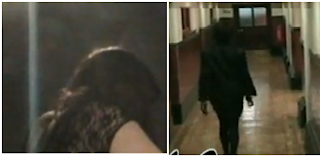
You can see that we built upon our preliminary task in our Film Opening. When looking at character representations and portrayals, we decided to have a sinister job interviewer interviewing a nervous applicant.
We portrayed this via the characters actions, for example, Lakeisha is constantly fidgeting with her hands and feet to show how nervous she is, and Cleo, the interviewer is very strong in her presence and uses her eyes a lot to show her intolerance for Lakeisha’s wet character.

Connectively, we used some of these techniques in our film opening. For example, Cleo’s authority is shows through the way she carries herself and her promiscuity is shown through her dress sense.
Chloe’s insecurities and anxiety are shown through her smoking the cigarette and the tearing up of the letter.
Finally, Cameron’s masculinity and blasé attitude toward his girlfriend is portrayed through his decision to cheat on his girlfriend so casually.
Another thing we learnt as a group form the preliminary task was how to successfully shoot different camera angles and shots. For example, we used a shot reverse shot and match on action shot in our film opening and we also used these in our Preliminary task. I doubt these would have been so successful without the practice in the preliminary task.

I feel that much progress has been made since the making of our Preliminary Task. But i also feel that without the Preliminary Task, the film opening would not have been as successful.
Overall, i am very pleased that i can compare the two and see that as a group we made positive progress.
When comparing the two, there are very significantly major differences. The titles in the preliminary task were very basic and looked as though we had spent no time on them at all. As you can see, they look unrefined and as though they do not have a relevant theme or genre to them. Whereas the film opening titles on the other hand look a lot more professional and relevant to our genre.

During the editing process of the preliminary task, we were unaware of the technical side of premier pro so we simply went to the ‘titles’ section and found a font that looked presentable. I can still say that this was a learning process for me as I would not have known where to find the icon that allows you to add titles onto footage.
Further, I do not look back at the preliminary task with regret because we were just beginning to learn about the technical side behind premier pro.
I can feel positive about the preliminary task because I know that were I to do one again, it would look a lot better and much more professional. From this I can understand that I have made progress and learnt from this project.
For the film opening, we used After Effects which is much more advanced in its titles and effects. We found that we could manipulate the titles to do pretty much whatever we wanted them to do.
To present our production company ‘SLACC Productions’ we used a yellow lightning effect which represented our company in a high class dramatic way and portrayed them as being of high importance. I feel that these titles were so much more effective than the previous ones.
Major improvements were made concerning filming. In the preliminary task, there were some shaky shots and background noise could be heard.
In the final cut of the film opening, we cut out most of the sound apart form when Cameron and Cleo are running and laughing up the stairs and when Chloe is tearing up Cameron’s love letter, so noise pollution would not have affected us in the same sense.
The sound that we did use in the film opening was relevant and clear sounding, whereas some of the sounds in the preliminary task were irrelevant and neither here nor there.
When looking back and comparing the two, I can see that the preliminary task has some accidental mistakes and errors whereas the Film Opening has deliberate aspects such as the shaky camera angles, sound and costumes.
Continually, for the preliminary task, our characters were not given time to select costumes or appropriate outfits as we filmed it all at school and so were in uniform. Whereas for the Film Opening, we filmed at our chosen locations and dressed our actors in appropriate clothing connective to the genre. This made our film have a much more real feel about it and also made it a lot more interesting for us a group to film.

You can see that we built upon our preliminary task in our Film Opening. When looking at character representations and portrayals, we decided to have a sinister job interviewer interviewing a nervous applicant.
We portrayed this via the characters actions, for example, Lakeisha is constantly fidgeting with her hands and feet to show how nervous she is, and Cleo, the interviewer is very strong in her presence and uses her eyes a lot to show her intolerance for Lakeisha’s wet character.

Connectively, we used some of these techniques in our film opening. For example, Cleo’s authority is shows through the way she carries herself and her promiscuity is shown through her dress sense.
Chloe’s insecurities and anxiety are shown through her smoking the cigarette and the tearing up of the letter.
Finally, Cameron’s masculinity and blasé attitude toward his girlfriend is portrayed through his decision to cheat on his girlfriend so casually.
Another thing we learnt as a group form the preliminary task was how to successfully shoot different camera angles and shots. For example, we used a shot reverse shot and match on action shot in our film opening and we also used these in our Preliminary task. I doubt these would have been so successful without the practice in the preliminary task.

I feel that much progress has been made since the making of our Preliminary Task. But i also feel that without the Preliminary Task, the film opening would not have been as successful.
Overall, i am very pleased that i can compare the two and see that as a group we made positive progress.
Friday, 16 April 2010
Evaluation Activity 6
Evaluation Task 6;
What have you learnt about technologies from the process of constructing this product?
Adobe Premiere Pro CS4
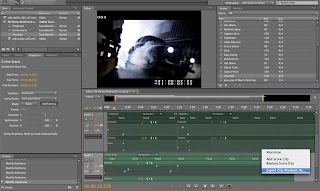
This was the first piece of software that we used. Nobody in our group had come across it before so we went to some extra classes to help us understand the intricacy of the programme.
When we first opened to programme, I was very confused and clueless as to where to begin- there were lots of drop down boxes, applications, toolbars and buttons which caused even more confusion. The general format of Adobe Premier Pro CS4 was something which I had never seen.
To instil the methods and techniques we would need when using this programme, we looked on YouTube at some tutorials on how to use it and become accustomed to it.
Here is an example of a tutorial;
It took a long time to get used to the different features and technical aspect of Premier Pro, but eventually we began to understand how it worked. Adobe Premier Pro would no w act as the foundation for our film; we would use it to make the film fit together to make a sequence and without it, our film opening would not have been able to be finalised.
I think that this programme allowed us limitless freedom with editing techniques and special effects. I am aware that many large budget movies have used this programme thus meaning a lot can be achieved from it.
After effects was another programme we used to make our film opening look professional.
This programme was more for our production company logos. There were many effects we could use and in the end, it just became about choosing one instead of another. We were sure to make our Production Company Logos in context to the genre of the film so as not to cause confusion and to reinforce the themes.

At the very early stages of filming, we used a tape based Sony camcorder.

When filming the preliminary task this is what we used and for the majority of the film opening. Loading the film from the tape onto the computer was very long and time consuming and after some time, we received new cameras which recorded onto a hard disk. This meant that all filming was internalised and we didn’t need to keep the tape safe or carry it with us. I preferred these cameras because their quality was better and they were smaller which made them easy to carry. They also gave us a better quality of picture and sound.

I found controlling and using the cameras difficult at first but began to understand and appreciate their technical side after a little while of filming.
If our film had contained dialogue, the second cameras would have been our priority, but we chose to exclude dialogue and replace it with a soundtrack.
The next piece of technical equipment we used was the audio recorder.

I thought the ones we used were of high quality as they picked up the slightest noise. I also thought that they were very straightforward in terms of use. It was also very simple to upload the sound on top of our film. We merely had to overlay the recording and mute the soundtrack and it was complete.
In order to find pictures and videos etc, we used some social networking sites such as Facebook.

As our target audience would be around the same age as our group, we had lots of photos online of placed we had been out with our friends or to parties. These pictures were very useful in giving examples of the teen lifestyle.
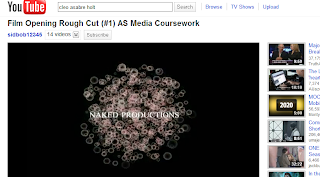
We uploaded our film opening to YouTube so that the public would comment on it. It also meant that our Film was accessible to everybody worldwide.
Overall, this project taught me a lot about the technical side of the media. Prior to this, i did not have much of an understanding for the different types of equipment and programmes used in this industry. I feel that the experience has been very productive as i can now expand upon my knowledge in upcoming projects.
What have you learnt about technologies from the process of constructing this product?
Adobe Premiere Pro CS4

This was the first piece of software that we used. Nobody in our group had come across it before so we went to some extra classes to help us understand the intricacy of the programme.
When we first opened to programme, I was very confused and clueless as to where to begin- there were lots of drop down boxes, applications, toolbars and buttons which caused even more confusion. The general format of Adobe Premier Pro CS4 was something which I had never seen.
To instil the methods and techniques we would need when using this programme, we looked on YouTube at some tutorials on how to use it and become accustomed to it.
Here is an example of a tutorial;
It took a long time to get used to the different features and technical aspect of Premier Pro, but eventually we began to understand how it worked. Adobe Premier Pro would no w act as the foundation for our film; we would use it to make the film fit together to make a sequence and without it, our film opening would not have been able to be finalised.
I think that this programme allowed us limitless freedom with editing techniques and special effects. I am aware that many large budget movies have used this programme thus meaning a lot can be achieved from it.
After effects was another programme we used to make our film opening look professional.
This programme was more for our production company logos. There were many effects we could use and in the end, it just became about choosing one instead of another. We were sure to make our Production Company Logos in context to the genre of the film so as not to cause confusion and to reinforce the themes.

At the very early stages of filming, we used a tape based Sony camcorder.

When filming the preliminary task this is what we used and for the majority of the film opening. Loading the film from the tape onto the computer was very long and time consuming and after some time, we received new cameras which recorded onto a hard disk. This meant that all filming was internalised and we didn’t need to keep the tape safe or carry it with us. I preferred these cameras because their quality was better and they were smaller which made them easy to carry. They also gave us a better quality of picture and sound.

I found controlling and using the cameras difficult at first but began to understand and appreciate their technical side after a little while of filming.
If our film had contained dialogue, the second cameras would have been our priority, but we chose to exclude dialogue and replace it with a soundtrack.
The next piece of technical equipment we used was the audio recorder.

I thought the ones we used were of high quality as they picked up the slightest noise. I also thought that they were very straightforward in terms of use. It was also very simple to upload the sound on top of our film. We merely had to overlay the recording and mute the soundtrack and it was complete.
In order to find pictures and videos etc, we used some social networking sites such as Facebook.

As our target audience would be around the same age as our group, we had lots of photos online of placed we had been out with our friends or to parties. These pictures were very useful in giving examples of the teen lifestyle.

We uploaded our film opening to YouTube so that the public would comment on it. It also meant that our Film was accessible to everybody worldwide.
Overall, this project taught me a lot about the technical side of the media. Prior to this, i did not have much of an understanding for the different types of equipment and programmes used in this industry. I feel that the experience has been very productive as i can now expand upon my knowledge in upcoming projects.
Evaluation Activity 4

This is Maslow's hierarchy of needs. ''Maslow's hierarchy of needs is a theory in psychology, proposed by Abraham Maslow in his 1943 paper A Theory of Human Motivation.[2] Maslow subsequently extended the idea to include his observations of humans' innate curiosity. ''
I will be using this to help me understand why our chosen target audience will be interested in our film.
Maslow’s Hierarchy demonstrates the different aspects that people need to have satisfied and accomplished in order to move on to the next step. Eventually, when all the steps have been completed, ‘Self Actualisation’ is made in which you are genuinely happy in yourself.
Excluding nutritional needs and requirements, in my opinion, our film could help its audience achieve Self Actualisation.
I say this because the opening scene is very destructive and demonstrates characters whose lives are going to fall apart due to acts irreversible. Viewers of the film would hopefully not be experiencing exactly the same hardships as the characters and so would feel good about their own lives and begin to appreciate that they do in fact have very fulfilled lives.
A sense of belonging and love is established via the fact that other people have problems and do not live a perfect life that is free from conflict. Viewers can then no longer feel alienated from society.
I would argue that esteem can be established by the viewers of the film feeling as though the choices that the characters in the film are marking are wrong. And were that situation to arise in their lives, they would choose not to cheat on their partner. This can boost esteem by making them feel good that they have the dignity and will to choose the right and positive path.
Aesthetic needs can be met by the way the characters dress and speak. We chose characters in which our audience can relate to and feel as though they are real. For the film to be aesthetically pleasing we chose to use setting which were believable and were places in which our target audience would sometimes even go to.
We wanted our characters to appear to be genuine and we feel that we achieved this. Aestheticism has been met.
Lastly, if our film did create a feeling of ‘Self Actualisation’ for its audience I would feel very proud and as though we had achieved a lot more than we thought capable. It would be very encouraging if our film made people feel positively about their own lives.
Who would be the audience for your media product?
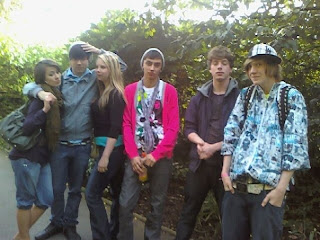
This is a photo of young people in their late teens. We decided as a group this would be our target audience as this is a time when people are beginning to experiment with the controversies that adult life brings. Between these ages in when some people begin getting into serious relationships and experimenting sexually.
We thought that a 12 rating would be too young as childhood and its naivety is still most present at this age. We decided that a 15 rating would be most appropriate as this is the age where most people are beginning to discover their personalities and sense of self.
As you can seem our chosen audience appear to be a social group that enjoy going out to parties and possibly drinking and smoking.
Here are some aspects/interests/habits that their lives may include and would contribute to our film had it been made into a whole production.
Music;
Their taste in music would be alternative and not necessarily what would be considered most popular in the chart.
We would consider this to be music that our target audience would not listen to and what is referred to as ‘Pop’. Jay Z and Alicia Keys ''Empire State of Mind''
On the other hand, possible artists that they may listen to would be Hot Chip. I say this because their music is alternative and containts subliminal messages of what many teenagers would relate to. their music also has an electro/trance feel to it which is suggesstive of the target audience behaviours and attitudes.
Things they may watch on the Television may include; Waterloo Road, Hollyoaks, 90210, Skins, One Tree Hill, The OC etc. All of which encapsulate the teen lifestyle and the hardship teenagers undergo, thus meaning real teenagers can relate.
http://www.youtube.com/watch?v=_kFulIjSpdg&feature=related - Skins Clip.
Our target audience would most likely enjoy watching horror films and thriller films. Clearly they would also watch other genres but as teenagers they would like to watch films in a group where they can engage with one another and feel the fear together. It is stereotypical of teenagers to group together to watch a scary film and is seen by many as ‘fun’.
Places where they would shop for clothing;
Highstreet trends such as TopShop. They would stray from JD sports and stereotypically ‘chavvy’ clothing. Other shops may include Urban Outfitters and All Saints- these are places renowned for originality which is what all teenagers aspire to be.
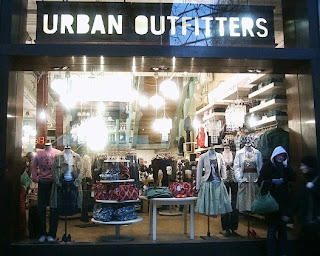
Social Life;
In the summer, our teenagers could be found in a group at the park enjoying the sunshine. Possibly smoking and drinking. Their nightlife would include partying and getting drunk and socialising with others and sexual antics including homosexuality. Clubbing would also be high on their agenda.
Here is a photo of a group of girls out clubbing at Tiger Tiger. As you can see their clothing is suggestive and promiscuity would probably be present.
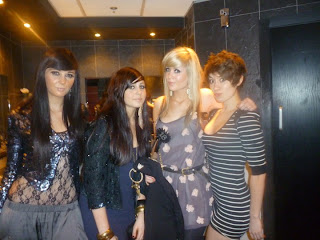
Following these events would come regret. This is established through our film where Cameron cheats on Chloe. He does in fact love Chloe he has just stupidly made a mistake.
Habits and interests;
Their habits and interests may be very harmful; some being eating disorders such as anorexia and bulimia, possible self harm and intoxication and extreme drinking.
More constructively, some of them would have interests that are positive, such as playing an instrument, dancing, a keen interest in their studies etc.
Our target audience would fall somewhere in between these habits and interests.
Likes/Dislikes;
They would dislike anything that they cannot relate to or find degrading. For example, something which they would not like could be ‘The Simple Life’ with Paris Hilton. I say this because it involves Paris behaving very self obsessed and as though she is very stupid and enjoys spending lots of money just because she can.
They would enjoy things with more depth and significance to them such as ‘The Breakfast Club’ which is a film about teenagers in detention and how they unite and rebel against the detention system.
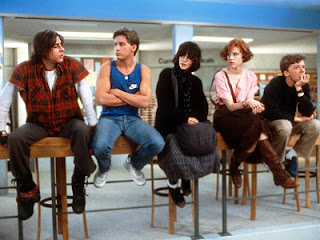
Why our target audience would like our film;
They would like and enjoy our film because it relates to and communicates to teenagers experiencing pressures and going through difficult relationships. As mentioned before, they would enjoy or film because it contains elements of horror.
Evaluation Activity 3

What kind of institution might describe your media product and why?
Here, you can listen to a 'Directors Commentary' which our group created. We were finding it difficult to decide on a time where we would all be available to record this and at first we decided that we could record it individually and then cut and edit it all together. Eventually we settled on a date in which we were all free and we began recording.
Initially it was very difficult as we had never recorded anything using a Marantz voice recorder and we soon became aware how sensitive it was and that a noise from another room could be picked up by it.
We did alot of takes and we knew we had to do alot of editing so eventually we drafted a rough script which we could follow and we managed to record it in one take which meant that hardly any editing had to be done.
This type of institution might describe our media product because it is becoming ever more common for directors to include the option for their audience to listen to their film with a voiceover of what each frame, camera angle, prop, positioning, setting etc may indicate or signify.
As a group i think we did very well to record the voice over in one take after much deliberation. It was a very satifying and new experience which we all enjoyed and would now be more aware of how to approach it were we to do a voice over in any future projects.
Evaluation Task 2
How does your media product represent different social groups?

To the right is a picture of Cleo. Her role within the film opening is to appear seductive, lustful and shameless. She is also dressed to give off this impression.
Similar to Cleo’s character is Jinx Johnson from Die Another Day (Played by Halle Berry). Her first appearance in the movie is her walking seductively in a bikini out of the sea. Immediately, James Bond (played by Pierce Brosnon) notices her and gazes at her as though she is now an object that he wants to obtain.
Continually, this is what we wanted to achieve through Cleo’s character. Halle Berry’s character conforms to the stereotype that women in films in order to gain attention of a sense of importance must use their sexual assets.
Although this may not be something we liked and feel is true ourselves, we thought that using this technique would be most successful in establishing Cleo’s character.
Our media product does not want to promote dressing promiscuously or behaving in such ways but we did need to get across to the audience that Cleo’s character is a danger to Chloe and Cameron’s relationship. We needed to make her appear a threat and characterisation was the best way to achieve this effect.
Using women in films to destroy/use/take down the men is an ongoing trend and will continue to be used in film making so long as women are seen in such lights. Examples of this are the characters of Nyah Nordoff-Hall (Thandie Newton) and Ethan Hunt (Tom Cruise) in Mission Impossible 2. Nyah is a beautiful thief whom Ethan must trick into believing what he tells her. He is advised to remain emotionally objective but falls for the beauty that is Thandie Newton.
Overall, as this would be the best way to make the audience aware of Cleo’s intentions, I believe that what we decided was for the best. Though if we had a larger budget and more time, we would have liked to include a female that does not use her assets or sexuality to achieve power over men.
Accordingly, I feel that women being presented in such ways dematerialises them and turns them into objects of desire. It would have been positive to have achieved this had we had more time.

To the right is a picture of Cleo. Her role within the film opening is to appear seductive, lustful and shameless. She is also dressed to give off this impression.
Similar to Cleo’s character is Jinx Johnson from Die Another Day (Played by Halle Berry). Her first appearance in the movie is her walking seductively in a bikini out of the sea. Immediately, James Bond (played by Pierce Brosnon) notices her and gazes at her as though she is now an object that he wants to obtain.
Continually, this is what we wanted to achieve through Cleo’s character. Halle Berry’s character conforms to the stereotype that women in films in order to gain attention of a sense of importance must use their sexual assets.
Although this may not be something we liked and feel is true ourselves, we thought that using this technique would be most successful in establishing Cleo’s character.
Our media product does not want to promote dressing promiscuously or behaving in such ways but we did need to get across to the audience that Cleo’s character is a danger to Chloe and Cameron’s relationship. We needed to make her appear a threat and characterisation was the best way to achieve this effect.
Using women in films to destroy/use/take down the men is an ongoing trend and will continue to be used in film making so long as women are seen in such lights. Examples of this are the characters of Nyah Nordoff-Hall (Thandie Newton) and Ethan Hunt (Tom Cruise) in Mission Impossible 2. Nyah is a beautiful thief whom Ethan must trick into believing what he tells her. He is advised to remain emotionally objective but falls for the beauty that is Thandie Newton.
Overall, as this would be the best way to make the audience aware of Cleo’s intentions, I believe that what we decided was for the best. Though if we had a larger budget and more time, we would have liked to include a female that does not use her assets or sexuality to achieve power over men.
Accordingly, I feel that women being presented in such ways dematerialises them and turns them into objects of desire. It would have been positive to have achieved this had we had more time.
Thursday, 15 April 2010
Monday, 22 March 2010
Equipment List
For our film we will be needing various pieces of equipment to help us film/shoot at our chosen locations. This is a list of some of the things we will need;
1) Cam-corder
2) Tripod
3) Photo Frame
4) Photo of Chloe and Cameron
5) Letter from Cameron to Chloe
6) A House (with stairs and a bed)
7) A cigarette
8) A firewire cable
9) A computer with Adobe Premier Pro and After Effects installed.
1) Cam-corder
2) Tripod
3) Photo Frame
4) Photo of Chloe and Cameron
5) Letter from Cameron to Chloe
6) A House (with stairs and a bed)
7) A cigarette
8) A firewire cable
9) A computer with Adobe Premier Pro and After Effects installed.
Sunday, 21 March 2010
Kyle Cooper
Kyle Cooper is the most successful modern designer of motion picture title sequences. Cooper is a member of the Alliance Graphique Internationale and holds the honorary title of Royal Designer for Industry from the Royal Society of Arts in London. Cooper claims his greatest influence in his choice of profession is Stephen Frankfurt's opening title sequence for To Kill a Mockingbird (1962).
Kyle Cooper has directed over 150 film title sequences, and has been credited with "almost single-handedly revitalizing the main-title sequence as an art form". He is the founder of two internationally recognized film design companies, Imaginary Forces and Prologue Films. Cooper earned a M.F.A. in Graphic Design from the Yale School of Art.
Cooper created the title sequence for the film 'Seven' and he uses an enigma code to entice the audience into watching the film.
What i can learn from Kyle Cooper is that it is not always neccessary to give away the plot or idea behind a film straight away- the suspence will keep the audience interested and wanting to know more.
I can also learn that it is important to use titles that are relevant to the chosen theme in order to set the themes and mood.
Kyle Cooper has directed over 150 film title sequences, and has been credited with "almost single-handedly revitalizing the main-title sequence as an art form". He is the founder of two internationally recognized film design companies, Imaginary Forces and Prologue Films. Cooper earned a M.F.A. in Graphic Design from the Yale School of Art.
Cooper created the title sequence for the film 'Seven' and he uses an enigma code to entice the audience into watching the film.
What i can learn from Kyle Cooper is that it is not always neccessary to give away the plot or idea behind a film straight away- the suspence will keep the audience interested and wanting to know more.
I can also learn that it is important to use titles that are relevant to the chosen theme in order to set the themes and mood.
Friday, 19 March 2010
Saul Bass

Saul Bass was an American graphic designer and Academy Award-winning filmmaker.
His most renowned work however, was for his design on animated motion picture title sequences.
Bass worked for some of Hollywood's greatest filmmakers, including Alfred Hitchcock, Otto Preminger, Stanley Kubrick and Martin Scorsese. Amongst his most famous title sequences are the animated paper cut-out of a heroin addict's arm for Preminger's. The purpose of this imagery was to create a strong theme- addiction and drug abuse. Bass did this through skewing the paper cut-outs to give a jaunty effect- similar to addiction and drug abuse which is irrational and unstable. The Man with the Golden Arm
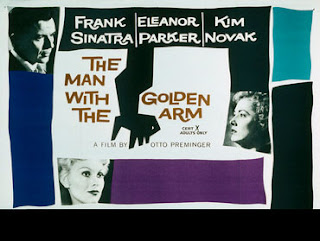
In Psycho, Bass's contributionbs were the vertical bars sweeping across the screen in a manic, mirrored helter-skelter motif at the beginning of Hitchcock’s 1960 horror. This staccato sequence is an inspired symbol of Norman Bates’ fractured psyche. Hitchcock also allowed Bass to work on the film itself, notably on its dramatic highpoint, the famous shower scene with Janet Leigh.
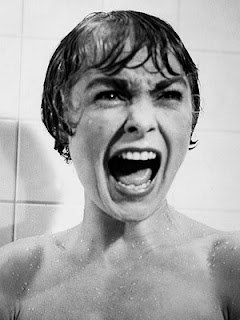
Bass created titles for other directors - from the animated alley cat in 1961’s Walk on the Wild Side, to the motor racing sequence in 1966’s Grand Prix.
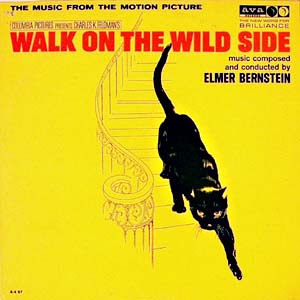
'My initial thoughts about what a title can do was to set mood and the prime underlying core of the film's story, to express the story in some metaphorical way. I saw the title as a way of conditioning the audience, so that when the film actually began, viewers would already have an emotional resonance with it.- Bass
What i can learn from Saul Bass is that in order to create a strong effect or theme, the images that coincide have to reinforce that theme- for example, for a horror movie, i would now be less subtle about my choice of images. I can understand that Bass's work was limited due to it's time frame and somewhat amateur compared to present technologies but the ideas and thought processes are still key and relevant in modern film making.
Synopsis
The synopsis of the film is that Chloe and Cameron were in a loving relationship and they cared a lot about each other. They even had plans to get married and have children.
Cameron and Chloe have been in a long-term relationship and Chloe is the more loving one and is completely devoted to Cameron.
It is then made clear than Cameron is becoming ever closer with the promiscuous character that is Cleo. At first he feels that they are merely sharing a friendship, but as time goes on, he begins to have sexual feelings toward her.
Cameron and Cleo sleep together and Cleo is not concerned with Chloe or her feelings. Cameron does feel guilty but he continues meeting up with Cleo and sleeping with her.
Unbeknown to Cameron and Cleo, Chloe discovers their affair and becomes filled with rage and hatred. The once tranquil character that she was has become almost evil. She plots and schemes to destroy Cameron and Cleo by any means possible...
Cameron and Chloe have been in a long-term relationship and Chloe is the more loving one and is completely devoted to Cameron.
It is then made clear than Cameron is becoming ever closer with the promiscuous character that is Cleo. At first he feels that they are merely sharing a friendship, but as time goes on, he begins to have sexual feelings toward her.
Cameron and Cleo sleep together and Cleo is not concerned with Chloe or her feelings. Cameron does feel guilty but he continues meeting up with Cleo and sleeping with her.
Unbeknown to Cameron and Cleo, Chloe discovers their affair and becomes filled with rage and hatred. The once tranquil character that she was has become almost evil. She plots and schemes to destroy Cameron and Cleo by any means possible...
Influences
Influences;
Some films that inspired us were Basic instinct, Fatal Attraction and Body Heat.
‘Basic instinct is a film which centers on police detective Nick Curran (Douglas), who is investigating the brutal murder of a wealthy former rock star. Beautiful, seductive and wealthy crime writer Catherine Tramell (Stone) could be involved; over the course of the investigation, Detective Curran becomes involved in an intense relationship with the mysterious woman — who turns out to be very dangerous.’
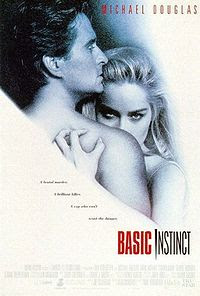
Fatal Attraction;
‘Fatal Attraction is a 1987 thriller film about a married man who has a weekend affair with a woman who refuses to allow it to end and who becomes obsessed with him. It stars Michael Douglas, Glenn Close and Anne Archer.’

Body Heat;
‘During a particularly intensive Florida heatwave, Ned Racine (William Hurt), an inept and rather sleazy lawyer, begins an affair with Matty (Kathleen Turner), wife of Edmund Walker (Richard Crenna), a wealthy businessman. Due to their affair, serious consequences follow.’

As you can see, we are using ideas from these films such as dominant women who become obsessed and violent with their partners. For example, if their partner says they are going to leave, the female will threaten to kill the man.
Our take on this is that Chloe cannot handle the fact that Cameron has cheated on her and she becomes violent and derranged wanting revenge.
Some films that inspired us were Basic instinct, Fatal Attraction and Body Heat.
‘Basic instinct is a film which centers on police detective Nick Curran (Douglas), who is investigating the brutal murder of a wealthy former rock star. Beautiful, seductive and wealthy crime writer Catherine Tramell (Stone) could be involved; over the course of the investigation, Detective Curran becomes involved in an intense relationship with the mysterious woman — who turns out to be very dangerous.’

Fatal Attraction;
‘Fatal Attraction is a 1987 thriller film about a married man who has a weekend affair with a woman who refuses to allow it to end and who becomes obsessed with him. It stars Michael Douglas, Glenn Close and Anne Archer.’

Body Heat;
‘During a particularly intensive Florida heatwave, Ned Racine (William Hurt), an inept and rather sleazy lawyer, begins an affair with Matty (Kathleen Turner), wife of Edmund Walker (Richard Crenna), a wealthy businessman. Due to their affair, serious consequences follow.’

As you can see, we are using ideas from these films such as dominant women who become obsessed and violent with their partners. For example, if their partner says they are going to leave, the female will threaten to kill the man.
Our take on this is that Chloe cannot handle the fact that Cameron has cheated on her and she becomes violent and derranged wanting revenge.
Tuesday, 16 March 2010
SMART Targets
S
Specific;
In order to make our film, we must be specific with what we choose to do. For example, costumes, setting and props must be planned and scheduled to make sure that we have guidelines. In order to be very specific, we will make a storyboard with which we can refer to during film making.
M
Measurable;
We will do a survey using fellow classmates or family members or our own judgment to make sure what is required has been achieved.
A
Achievable;
As a group we will use ideas and techniques which are achievable given the time and budget that we have. In other words, we cannot use idea which would cost alot of money or take a very long time.
R
Realistic;
Our film opening can be completed to a high standard and is a realistic target.
T
Time;
We will make sure that we are very aware of time and that it is not endless. Our final cut must be complete by the 19th April 2010 and we must meet this deadline.
As a group we need to take into account time limitations and deadlines- Everything must be complete by March 23rd.
Specific;
In order to make our film, we must be specific with what we choose to do. For example, costumes, setting and props must be planned and scheduled to make sure that we have guidelines. In order to be very specific, we will make a storyboard with which we can refer to during film making.
M
Measurable;
We will do a survey using fellow classmates or family members or our own judgment to make sure what is required has been achieved.
A
Achievable;
As a group we will use ideas and techniques which are achievable given the time and budget that we have. In other words, we cannot use idea which would cost alot of money or take a very long time.
R
Realistic;
Our film opening can be completed to a high standard and is a realistic target.
T
Time;
We will make sure that we are very aware of time and that it is not endless. Our final cut must be complete by the 19th April 2010 and we must meet this deadline.
As a group we need to take into account time limitations and deadlines- Everything must be complete by March 23rd.
Friday, 5 March 2010
Treatment
Treatment:
The title of our film became something of much deliberation. We decided on titles that were relevant to our theme and would give the audience and indication of what the film would entail. In the beginning we cut our list down to five names which were;
Infidel
Deceit
Pretence
Facade
Deception
In the beginning we called our film ‘Infidel’ and we were happy with this title as we thought it was a good indication that the film would be about cheating of some kind. After reviewing the film with the title ‘Infidel’ overlaid at the beginning, we thought that the title sounded a little weak and fragile. So we decided to go with Deceit as its sound is much more plosive.
Our film would begin with Cameron and Chloe. We would present their relation as being pretty much perfect. The couple would exchange love letters confessing their love for one another. We would film it in the summer with lots of scenes shot in the sun or at sunset for a more romantic effect. The scenes would consist of playful love and light passion. Just enough so that the audience could tell the couple are innocent and completely in love with one another.
Cameron would apply for a summer job at an open air swimming pool to be a lifeguard. He would be really excited about the job and when he finds out he has been successful, he becomes ecstatic and Chloe is also very happy for him.
Cameron would be working at the swimming pool five days a week and he would have the weekends off with which he would spend with Chloe.
One day at work, Cameron would be paying attention to the people in the pool and a girl would flirtatiously begin speaking with him. She would only be making small talk, but would clearly have deeper intentions.
Cameron goes home and thinks nothing of the girl he met at work, so doesn’t mention it to Chloe when he sees her on the weekend.
The following Monday, the same girl approaches his and they eat lunch together on their break as she also works at the pool. Cameron learns that her name is Cleo and he also learns that he is becoming attracted to her.
Cameron tells himself that it is a silly crush and nothing to be worri
ed about.
During the week at work, Cameron and Cleo switch numbers and begin texting at the weekend. Chloe asks who Cameron is constantly texting and he tells Chloe ‘Just a work colleague.’ Chloe being assumes the work colleague to be male and so doesn’t think of it again.
During the texting sessions, Cameron asks Cleo if she would like to come round some time and Cameron agrees.
The following week after work, Cameron invites Cleo round for an early tea. Cleo goes round and things get heated between them and they end up sleeping together.
Cameron decides to tell Chloe when he sees her on the weekend. When it comes to it, he cannot tell her, he is too busy texting Cleo.
Cameron then goes to the shops to get some cigarettes and Chloe takes this opportunity to go through Cameron’s phone.
The latest text from Chloe gives the game away as she is telling Cameron how good he was and how much she enjoyed that night.
Chloe doesn’t mention this to Cameron and acts as though everything is normal.
As soon as Cameron leaves, Chloe is distraught. This is when Chloe begins plotting against Cameron and Cleo.
She plans on finding out when they next meet up and walking in on them. She will then do what she will to destroy their partnership.
Our shots will consist of;
• Our production company logo (Naked Production_
• Our second logo (SLACC Productions)
• A long shot of The River Thames going from out of focus to being in focus.
• A medium shot of Chloe standing on Lambeth Bridge
• A long shot of Cameron and Cleo walking into Cleo’s house.
• A Shot Reverse Shot of Cameron and Cleo walking into the house
• A medium shot of Chloe standing on the bridge facing the river
• A low angle shot of Cameron and Cleo running up the stairs
• An over the shoulder shot of Chloe smoking a cigarette on the bridge
• A match shot of Cameron and Cleo hurriedly entering Cleo’s room
• A close up of the door closing
• An extreme long shot of the Houses of Parliament with Chloe’s cigarette visible in the left corner
• A medium long shot of Cleo and Cameron getting ever closer in her room
• A close up of Cameron and Chloe in a photo frame.
• An over the shoulder shot of Chloe smoking and holding a piece of paper in her hand (the audience do not know what this is yet)
• A big close of Chloe and Cameron to show how meaningful their relationship was but no longer is.
• A medium shot of the photo being kicked of its stand- suggestive of what is happening between Cleo and Cameron at this moment.
• An over the shoulder shot with Cameron’s love letter to Chloe faded over the top while Chloe rips it up.
• A shot of the title of our film ‘Deceit’
The title of our film became something of much deliberation. We decided on titles that were relevant to our theme and would give the audience and indication of what the film would entail. In the beginning we cut our list down to five names which were;
Infidel
Deceit
Pretence
Facade
Deception
In the beginning we called our film ‘Infidel’ and we were happy with this title as we thought it was a good indication that the film would be about cheating of some kind. After reviewing the film with the title ‘Infidel’ overlaid at the beginning, we thought that the title sounded a little weak and fragile. So we decided to go with Deceit as its sound is much more plosive.
Our film would begin with Cameron and Chloe. We would present their relation as being pretty much perfect. The couple would exchange love letters confessing their love for one another. We would film it in the summer with lots of scenes shot in the sun or at sunset for a more romantic effect. The scenes would consist of playful love and light passion. Just enough so that the audience could tell the couple are innocent and completely in love with one another.
Cameron would apply for a summer job at an open air swimming pool to be a lifeguard. He would be really excited about the job and when he finds out he has been successful, he becomes ecstatic and Chloe is also very happy for him.
Cameron would be working at the swimming pool five days a week and he would have the weekends off with which he would spend with Chloe.
One day at work, Cameron would be paying attention to the people in the pool and a girl would flirtatiously begin speaking with him. She would only be making small talk, but would clearly have deeper intentions.
Cameron goes home and thinks nothing of the girl he met at work, so doesn’t mention it to Chloe when he sees her on the weekend.
The following Monday, the same girl approaches his and they eat lunch together on their break as she also works at the pool. Cameron learns that her name is Cleo and he also learns that he is becoming attracted to her.
Cameron tells himself that it is a silly crush and nothing to be worri
ed about.
During the week at work, Cameron and Cleo switch numbers and begin texting at the weekend. Chloe asks who Cameron is constantly texting and he tells Chloe ‘Just a work colleague.’ Chloe being assumes the work colleague to be male and so doesn’t think of it again.
During the texting sessions, Cameron asks Cleo if she would like to come round some time and Cameron agrees.
The following week after work, Cameron invites Cleo round for an early tea. Cleo goes round and things get heated between them and they end up sleeping together.
Cameron decides to tell Chloe when he sees her on the weekend. When it comes to it, he cannot tell her, he is too busy texting Cleo.
Cameron then goes to the shops to get some cigarettes and Chloe takes this opportunity to go through Cameron’s phone.
The latest text from Chloe gives the game away as she is telling Cameron how good he was and how much she enjoyed that night.
Chloe doesn’t mention this to Cameron and acts as though everything is normal.
As soon as Cameron leaves, Chloe is distraught. This is when Chloe begins plotting against Cameron and Cleo.
She plans on finding out when they next meet up and walking in on them. She will then do what she will to destroy their partnership.
Our shots will consist of;
• Our production company logo (Naked Production_
• Our second logo (SLACC Productions)
• A long shot of The River Thames going from out of focus to being in focus.
• A medium shot of Chloe standing on Lambeth Bridge
• A long shot of Cameron and Cleo walking into Cleo’s house.
• A Shot Reverse Shot of Cameron and Cleo walking into the house
• A medium shot of Chloe standing on the bridge facing the river
• A low angle shot of Cameron and Cleo running up the stairs
• An over the shoulder shot of Chloe smoking a cigarette on the bridge
• A match shot of Cameron and Cleo hurriedly entering Cleo’s room
• A close up of the door closing
• An extreme long shot of the Houses of Parliament with Chloe’s cigarette visible in the left corner
• A medium long shot of Cleo and Cameron getting ever closer in her room
• A close up of Cameron and Chloe in a photo frame.
• An over the shoulder shot of Chloe smoking and holding a piece of paper in her hand (the audience do not know what this is yet)
• A big close of Chloe and Cameron to show how meaningful their relationship was but no longer is.
• A medium shot of the photo being kicked of its stand- suggestive of what is happening between Cleo and Cameron at this moment.
• An over the shoulder shot with Cameron’s love letter to Chloe faded over the top while Chloe rips it up.
• A shot of the title of our film ‘Deceit’
Thursday, 4 March 2010
Meeting Two;
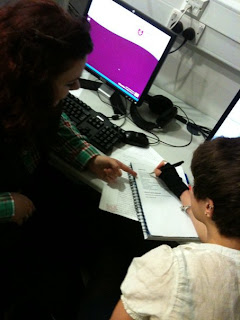
At our second meeting we began discussing a plot and chracters for our film. We decided to base our film around a couple or are in love until one of them sleeps with somebody else. We decided we would encorporate the thriller element by making the partner who gets cheated on wanting revenge.
After the story line was finalised, we produced storyboards. We worked tightly as a group and distributed different roles to different people.
For example, we elected each of us to complete equal quantities of work which were just as important as eachothers.
This made everything fair.
Wednesday, 3 March 2010
Meeting One;

At our first meeting, we discussed as a group which genres we would most like to work around. We had some very creative and interesting ideas to begin with. We initially decided to do a romantic comedy based around a man falling in love with a pug. We were going to film scenes of the man with his pug running through fields together as though they were in love. But we decided this was too abstract and nonsensical
Finally, we decided the best genre to base our film around would be a horror or a thriller. We thought this as it would be the most simple to convey through music and characterisation.
We were also a little confused as to how we would go about creating humour in two minutes of film. So we opted for the thriller/horror genre.
Monday, 1 March 2010
Ratings

Suitable for 15 years and over. According to the bbfc, 'No one younger than 15 may see this film in a cinema. No one younger than 15 may rent or buy a 15 rated video work. Strong language can be used in 15 rating film. Language such as f***, b****, p**** etc may be used, anad parents of children younger than 15 would feel this inappropriate for their children.
As there is no dialogue in the opening of our film, this would not apply, but we decided as a group that were the film to be developed fully, such language would be used by the actors when discussing characters.
For example;
Chloe: ‘Cameron is the biggest p**** for sleeping with her.’
We also decided, that were the film to be developed fully, there may be murderous scenes and scenes of violence which would not be appropriate for younger children.
For example;
Chloe and Cleo may have a fight and Chloe may use a knife to stab/kill Cleo or Cameron.
Rough Cut and feedback from fellow students
As you can see, this is our rough cut. The bulk of filming and editing has been done but some minor and some major aspects need to be reviewed and changed/enhanced such as the music at the end of the film turning from minor to major.
This needs to be changed as it doesn't fit with the rest of the film opening and would confuse the audience.
Here are a few comments that people made after watching our rough cut of our film opening;
'I thought the opening was very good and i liked the way the water fades in at the very beginning. It really sets the scene' - Riham Walcott
'I thought it was all cool but the music at the end doesn't make sense to me. it turns from being sad to happy and i didn't really get that.' - India Harley
'I liked the shots of Chloe on the bridge, i thought they were all really scenic and created a very mysterious mood' - Nathaniel Prince
'I don't really understand the connection between the characters. What does Chloe have to do with Cleo and Cameron and why is she so upset? Maybe you could make this clearer in some way.' - Chauntelle Stafford.
Considering the above comments, i feel that we can use the critisisms constructively to improve our film opening. For example, we will definately make it clearer as to how the characters are connecetd. We will do this writing a love letter from Cameron to Chloe.
I think lots can be taken from these comments and we will use them in our group to help us improve the confusing aspects and maintain the positive ones.
Location Recee;


For Chloe's scenes, we wanted to create a sinister and melancholy feel. In order to achieve this, we decided that the best time to film would be on a bridge overlooking water at night.
We thought the bridge and the water were important elements because they would suggest notions of suicide and death from Chloe's part.
Accordingly, we chose Lambeth bridge as you can see above. Another reason for choosing Lambeth Bridge was because it overlooks London making it aesthetically pleasing. At night, the lights from the Houses of Parliament and the London eye work extremely well against the bleak bridge and black water.
We needed this scene to be well lit because if it wasn't, the camera would not have picked up Chloe and so would not have been successful.
We also wanted these scenes to be the most dramatic and we thought Lambeth Bridge met all our critera.
For Cameron and Cleo's scenes, we wanted to film at an every day normal setting. We thought the best place for this would be a house as everybody is familiar with being in a home environment and a bedroom.
We filmed at Cleo's house, filming Cameron and Cleo walking in from the outside of her house. This was to establish the setting.
(upload photo of my house here)
We then filmed to stairs to show that the characters were headed to a bed(upload bedroom photo here)room (unpoload stairs here) and we then filmed the characters in the bedroom.
I thought that the locations we chose were most suitable for our film opening because they fitted the genre perfectly and created the exact mood that we needed. So overall, i was very happy with the locations.
Sunday, 28 February 2010
What a good title sequence should include...
Introduction to characters;
A successful film opening will establish characters and what their positions may be within the film and will do this very quickly to keep the audience engaged and engrossed in the action. Characters in film openings tend to have their introductions based around their mood, career/job, thoughts, feelings, personality, interests and habits etc. This so that the audience can have an understanding of what is to be expected for the duration of the film.
Bridget Jones’s Diary does this very well for example and within minutes institutes that Englishness and the stereotypical properness with which England can be associated with is a key ingredient for the film. Also, in this opening, the audience can learn merely from Bridget’s appearance that she feels out of place and is in fact single and seeking a partner. The fact that she is overweight and red in the face creates sympathy toward her and means that the film will appeal to women as she is not a promiscuous beautiful woman, meaning she is not a threat to the target audience and is likeable.
Continually, a Romantic Comedy may present two characters, generally a man and a woman living separate lives and feeling as though they want to settle down. More often than not, the directors choose to run these scenes one after the other to show the audience that the characters will have some sort of contact or interaction as the film beings to unfold. This technique is very successful as it makes the audience anticipate who, what, when where and how these characters will meet and under what circumstances.
The way characters relate with other characters is an important aspect in establishing roles. For example, in The Notebook, which is a romantic film, teenagers Allie and Noah are the protagonists and the first time they meet, the audience are made aware of Allie’s heritage and that she is a wealthy girl of high-class, whereas Noah on the other hand is a poor simple boy with a strong sense of adventure. This is shown through the way these characters are dressed and the way they speak. Noah and Allie’s first meeting is at a fairground and Noah asks the beautiful high-class Allie if she would like to dance with him and her response is no thank you, I don’t want to, she then skips off and he gazes after her. This opening scene enforces the character’s backgrounds, values and gives Allie a sense of status, in that she is above Noah due to her wealthy upbringing.
These two elements are so important in making a film successful because the opening is what makes or breaks the film, if an audience is bored by the beginning- which is supposed to be the most exciting and engaging part of the movie- then the film is not going to be a hit. Gripping and seizing audience attention right from the beginning is the most effective way to make a film a success.
CAST;
Who will be cast in a film is so important. Very renowned actors can sometimes be the selling point of films, and some audiences will not be concerned with the genre/theme as long as their favourite actor will be present in the film.
Most people, if they enjoy watching films, will have their personal preferences when it comes to actors or who has produced or even edited the movie and will only want to see certain films because of this.
Another reason why the cast is so important is because very mainstream A-list actors are extremely expensive, and the film company using them will advertise and flaunt the actors they are using as much as possible to make it clear that popular stars have contributed to the making of the film.
For example, in Mr & Mrs Smith, Angelina Jolie and Brad Pitt where the focal point of the film, and their names were shown in the opening of the film as soon as possible. Without them being involved, it is almost certain that the film would not have gained anywhere near as much publicity or viewings and sales would not have sky rocketed and the directors would have probably lost money paying for stunt doubles etc.
In films that are of a much smaller budget and do not use popular mainstream actors, the cast will be shown/mentioned via credits at the very end because who they are is not important as most people will not have heard of them thus meaning the plot in smaller budget films overrides the importance of the actors. This does mean that sometimes, larger budget films can get away with a poor plot so long as big actors are involved.
LOCATION;
The location of the film is of high importance also as the directors do not want to confuse the audience, the location must connect in some form with the characters and plot. If this fails to happen, the audience can feel very out of place. The location must be suitable so that the audience can have an understanding of under what circumstances the action is taking place and they can really get a feel for the atmosphere of the movie.
For example, in the Horror film, ‘The Hills Have Eyes’ the setting is cross-country and very sparse in terms of civilisation. This evokes danger because the audience will already know the film is a horror through advertising and the setting will mean should the characters meet with any monsters, there will be nowhere for them to run to. If this film were set in the hustle and bustle of New York City for example, the same fear and desperation could not be conjured and the film would surely fail.
HISTORICAL PERIOD;
The title sequence of the film will also need to establish in what time period the film is set. For example, the film I-robot is a futuristic science-fiction/action movie set in the future, in a world in which robots are commonly seen and used as servants. Del Spooner (Will Smith) is a Chicago police detective who dislikes the rapid advancement of technology, including robots. Clearly the futuristic element of this film is key in making the film believable- currently robots do not exist, but they could in the future. The film makes sure advanced technology is almost everywhere you look; everything appears to be futuristic from Will Smith’s digital police badge to amazing and intricate appearance of the robots. This is exactly what the audience has paid to see and was one of the reasons why I-Robot was successful. This historical period is important as it more often than not acts as the tying link between the action, characters, sound, costume, props and all the other elements within the making them all fit together and work in perfect sequential rhythm.
MOOD;
The mood of the film is very key in establishing the theme, but is not always immediately noticed as it is not visually present like all the other aspects, this is why the mood is one of the most difficult tasks for the directors to create successfully without being too subtle or too obvious.
For the mood to be logical and accepted, it must appeal to its target audience. For example, the film ‘Girl, interrupted’ which is about a young woman’s experience inside a psychiatric hospital has a very melancholic dark yet inspirational mood and if this film took on the mood of the romantic comedy ‘50 First Dates’ it would remove the serious and sombre mood.
It is important to establish the mood as soon as possible because this is what will keep the audience wanting more.
The fact that ‘Girl, interrupted’ is serious and sombre and about a young woman who is 18 is what reels the target audience in, as this age for woman is notably a time of confusion and rebellion thus meaning the target audience will feel they can empathise with Susanna played by Winona Ryder- the protagonist.
Overall, a title sequence must involve all of these to be very auccessful. Most films do follow the conventions but there are some which are unconventional and continue to be major hits because of this.
What i can learn from this is that our film opening must follow these guidlines to make is as professional and appealing as possible.
A successful film opening will establish characters and what their positions may be within the film and will do this very quickly to keep the audience engaged and engrossed in the action. Characters in film openings tend to have their introductions based around their mood, career/job, thoughts, feelings, personality, interests and habits etc. This so that the audience can have an understanding of what is to be expected for the duration of the film.
Bridget Jones’s Diary does this very well for example and within minutes institutes that Englishness and the stereotypical properness with which England can be associated with is a key ingredient for the film. Also, in this opening, the audience can learn merely from Bridget’s appearance that she feels out of place and is in fact single and seeking a partner. The fact that she is overweight and red in the face creates sympathy toward her and means that the film will appeal to women as she is not a promiscuous beautiful woman, meaning she is not a threat to the target audience and is likeable.
Continually, a Romantic Comedy may present two characters, generally a man and a woman living separate lives and feeling as though they want to settle down. More often than not, the directors choose to run these scenes one after the other to show the audience that the characters will have some sort of contact or interaction as the film beings to unfold. This technique is very successful as it makes the audience anticipate who, what, when where and how these characters will meet and under what circumstances.
The way characters relate with other characters is an important aspect in establishing roles. For example, in The Notebook, which is a romantic film, teenagers Allie and Noah are the protagonists and the first time they meet, the audience are made aware of Allie’s heritage and that she is a wealthy girl of high-class, whereas Noah on the other hand is a poor simple boy with a strong sense of adventure. This is shown through the way these characters are dressed and the way they speak. Noah and Allie’s first meeting is at a fairground and Noah asks the beautiful high-class Allie if she would like to dance with him and her response is no thank you, I don’t want to, she then skips off and he gazes after her. This opening scene enforces the character’s backgrounds, values and gives Allie a sense of status, in that she is above Noah due to her wealthy upbringing.
These two elements are so important in making a film successful because the opening is what makes or breaks the film, if an audience is bored by the beginning- which is supposed to be the most exciting and engaging part of the movie- then the film is not going to be a hit. Gripping and seizing audience attention right from the beginning is the most effective way to make a film a success.
CAST;
Who will be cast in a film is so important. Very renowned actors can sometimes be the selling point of films, and some audiences will not be concerned with the genre/theme as long as their favourite actor will be present in the film.
Most people, if they enjoy watching films, will have their personal preferences when it comes to actors or who has produced or even edited the movie and will only want to see certain films because of this.
Another reason why the cast is so important is because very mainstream A-list actors are extremely expensive, and the film company using them will advertise and flaunt the actors they are using as much as possible to make it clear that popular stars have contributed to the making of the film.
For example, in Mr & Mrs Smith, Angelina Jolie and Brad Pitt where the focal point of the film, and their names were shown in the opening of the film as soon as possible. Without them being involved, it is almost certain that the film would not have gained anywhere near as much publicity or viewings and sales would not have sky rocketed and the directors would have probably lost money paying for stunt doubles etc.
In films that are of a much smaller budget and do not use popular mainstream actors, the cast will be shown/mentioned via credits at the very end because who they are is not important as most people will not have heard of them thus meaning the plot in smaller budget films overrides the importance of the actors. This does mean that sometimes, larger budget films can get away with a poor plot so long as big actors are involved.
LOCATION;
The location of the film is of high importance also as the directors do not want to confuse the audience, the location must connect in some form with the characters and plot. If this fails to happen, the audience can feel very out of place. The location must be suitable so that the audience can have an understanding of under what circumstances the action is taking place and they can really get a feel for the atmosphere of the movie.
For example, in the Horror film, ‘The Hills Have Eyes’ the setting is cross-country and very sparse in terms of civilisation. This evokes danger because the audience will already know the film is a horror through advertising and the setting will mean should the characters meet with any monsters, there will be nowhere for them to run to. If this film were set in the hustle and bustle of New York City for example, the same fear and desperation could not be conjured and the film would surely fail.
HISTORICAL PERIOD;
The title sequence of the film will also need to establish in what time period the film is set. For example, the film I-robot is a futuristic science-fiction/action movie set in the future, in a world in which robots are commonly seen and used as servants. Del Spooner (Will Smith) is a Chicago police detective who dislikes the rapid advancement of technology, including robots. Clearly the futuristic element of this film is key in making the film believable- currently robots do not exist, but they could in the future. The film makes sure advanced technology is almost everywhere you look; everything appears to be futuristic from Will Smith’s digital police badge to amazing and intricate appearance of the robots. This is exactly what the audience has paid to see and was one of the reasons why I-Robot was successful. This historical period is important as it more often than not acts as the tying link between the action, characters, sound, costume, props and all the other elements within the making them all fit together and work in perfect sequential rhythm.
MOOD;
The mood of the film is very key in establishing the theme, but is not always immediately noticed as it is not visually present like all the other aspects, this is why the mood is one of the most difficult tasks for the directors to create successfully without being too subtle or too obvious.
For the mood to be logical and accepted, it must appeal to its target audience. For example, the film ‘Girl, interrupted’ which is about a young woman’s experience inside a psychiatric hospital has a very melancholic dark yet inspirational mood and if this film took on the mood of the romantic comedy ‘50 First Dates’ it would remove the serious and sombre mood.
It is important to establish the mood as soon as possible because this is what will keep the audience wanting more.
The fact that ‘Girl, interrupted’ is serious and sombre and about a young woman who is 18 is what reels the target audience in, as this age for woman is notably a time of confusion and rebellion thus meaning the target audience will feel they can empathise with Susanna played by Winona Ryder- the protagonist.
Overall, a title sequence must involve all of these to be very auccessful. Most films do follow the conventions but there are some which are unconventional and continue to be major hits because of this.
What i can learn from this is that our film opening must follow these guidlines to make is as professional and appealing as possible.
Mood Board
Character Analysis
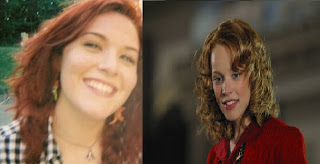
Chloe is genuine and fun loving. She has a kind-hearted nature and would go out of her way to help somebody if they needed it. Features of her personality are that she is always smiling. Chloe is the girlfriend of Cameron.
We chose to look at Allie (Rachel McAdams) from the notebook. Rich, beautiful Allie falls in love with a young man from the wrong side of the tracks, similar to Chloe and Cameron. Allie is very proper and knows right and wrong, she is good-natured and a happy character with positive attributes.
Character Planning
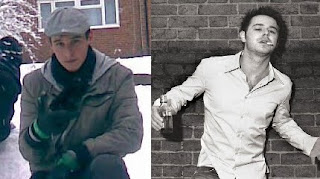
We chose to use Cameron as the cheating male. Cameron speaks with a very strong south london accent, and his interests are football, girls, and drinking. We used Tommy Johnson (Danny Dyer) from football factory as a starting point. Cameron is practically the younger version of Tommy through his attitudes, accent and activities.
In the opening of the film, Cameron cheats on his girlfriend Chloe with Cleo. With Cameron's very blasé nature, he does not think about the consequences his actions could cause were Chloe to discover this.
Storyboards/Planning
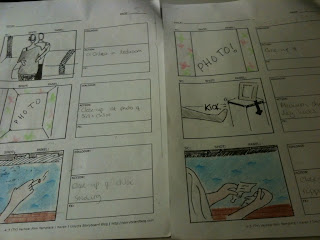
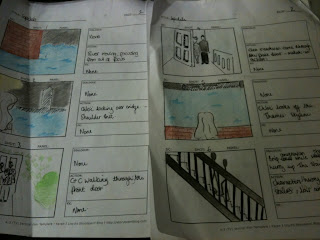
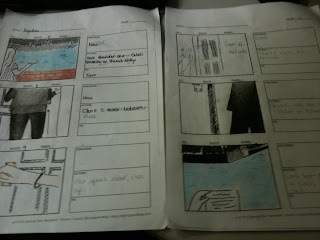
Here we created a storyboard in order to remain organised. We designed a series of illustrations displayed in the sequence that the film would be ordered in. This meant that we knew which direction the film was going in and how we were going to create each scene and with which shots and why.
The first storyboards were created at the Walt Disney Studio during the early 1930s.
As you can see, the principle is exactly the same.
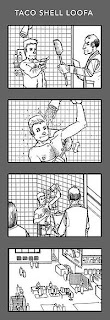
I found using storyboards very useful as it meant we couldn't get sidetracked and could use guidelines were any of our group to become confused about what was meant to be happening during hte filming process
Character Planning
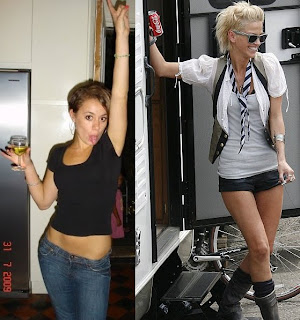
We decided to use Cleo for the role of the promiscuous girl in our film opening as in this photo she fits the stereotype. She achieves this by showing body parts such as her tummy and chest which is suggestive of her personality. The glass of wine she is holding connotes imagery of a party girl and the lifestyle that fits with that. Another reason Cleo's character fits the promiscuous stereotype is her tongue piercing and purposely seductive wide eyed expression.
We got this idea from St. Trinians - an anarchic school for uncontrollable girls. We chose to look at 'Roxy' (Sarah Harding) as she shares similar sterotypical qualities such as minimal clothing and the mindset of knowing she has a certain hold and control over men.
Comparing Film opening sequences (No Country For Old Men, 50 First Dates and Girl, Interrupted)
I looked at No Country for Old Men, which is a sub-genre of the Western and Horror field; Girl Interrupted, which comes under the category of a biography, and 50 First Dates, which is a Romantic Comedy.
I found that No Country for Old Men and girl interrupted did in fact share some qualities.
Firstly I found that the music in both films conveys serious/dramatic themes to the audience. The contrasting element is that No Country for Old Men opens with music that is sinister and serious, whereas although Girl Interrupted opens with a serious tone it also gives the audience the impression that the story which is about to unfold will have a deeper meaning, rather than being just horrific and gory.
The directors have made it very clear to the audience what to expect from the films. They have done this purely through music and tonal qualities; we know Girl, Interrupted will be some sort of life story from the poignancy of the music, and that No Country for Old Men will contain elements of the western genre combined with horror undertones through the menacing pitches.
Completely contrasting both films, the Rom/Com I chose to look at opens with very playful music, consequently suggesting a light-hearted film. Combinations of Hawaiian strumming instruments are used to set the scene and from this the spectators know that the film will not follow a serious attitude- quite the opposite.
The opening to 50 First Dates is very significant in setting the scene- it opens with a long shot of a very romantic, peaceful looking sunset on a sandy beach surrounded by palm trees, and within the first few minutes of the film, sex is the main topic of all conversations among the women that are featured. They are all discussing the same man they slept with, in a comical fashion- Henry Roth (played by Adam Sandler). This accentuates the offhand/joking manner we can expect to see throughout.
The characters in all three films are conventional to their genre; Even though No Country for Old Men is a sub-genre of western and horror, the way in which the characters are represented brings the two together in such a way that we know the film is not going to be one dimensional.
In the opening scene, we see a sheriff- conventional iconography of the ‘Western genre’- who appears to be very relaxed and calm. As the audience, we know he is a sheriff due to clear icons such as his uniform and the office he is in.
Another vital clue that this film is a Western is the Deep South American accent; when we watch a western, this is the accent we can expect to hear.
The horror aspect comes into play when we meet Anton Chigurh (played by Javier Bardem) who is the antagonistic villain. We know this because he is dressed in black from head to toe- The directors have paid close attention to detail here- even his hair and eyebrows are jet black. To me this suggests that there is no goodness or remorse at all. His clothing contrasts that of the sheriff’s as well, which is very light and neutral, a definite connotation of good versus evil.
Girl, Interrupted shares some similarities with No Country For Old Men in that the first thing we see is a close up shot looking through metal bars- giving the effect of being trapped or of feeling claustrophobic- The film is set in a mental institution, which is a place that I would associate with these feelings.
The sky is very dark and gloomy and the whole opening could fit nicely into the horror category. As soon as we meet the characters though, we know this is not right; we see a close up of our protagonist cradling another patient in her arms (this patient is played by Angelina Jolie). This reassures the audience that there is no reason to be afraid in a literal sense. Susanna (played by Winona Ryder)- the protagonist carries an aura of confidence and solidarity.
The actresses in this film are all very renowned and would play a bit role in the selling the film and winning over the public.
Susanna is portrayed as being thoughtful and she is the character we identify with,her mannerisms plainly direct the audience to feel close to her, almost to the extent they feel that they are her, or can feel everything that she feels.
The directors have achieved this through non-diegetic sound; In the opening, Susanna asks rhetorical questions that everyone will have wanted to ask during a time of anxiety or confusion; we admire her for this confidence and strong sense of identity. We are almost in awe of her whole presence.
Moving on to the character representation in 50 First Dates where we meet women who are depicted as being needy and utterly obsessed by men. This is a conventional feature of a Rom/Com as it is not realistic and it means the directors can portray the women in the film as being ‘the same as the rest’ or as though they have no value or personality.
From this character representation, we know that the protagonist (Henry Roth- the topic of conversation for the women) is going to fall for somebody who will have original qualities and won’t be so needy or male-obsessed.
The tones in 50 first dates are light and easy to manage; the film seems to be following the structure of your stereotypical Rom/Com quite religiously. As do all three films I have compared and contrasted.
Personally, I found all films very successful in their efforts to reach their target audience and be box-office hits. A lot of this was achieved through whom they chose to cast in their films- they have all used world-renowned actors/actresses. These would be major selling points for all three films.
I thought that the films were all very conventional and followed the guidelines of their genre consistently- they all featured conventional icons and music to their genre.
For me, the music is what makes a film- for instance, you could watch a horror without the music and you wouldn’t be scared. So during the opening of each film, I felt that the music played a big role in setting the scene and I generally think the directors were successful in their attempts at making their films a triumph in the cinema.
I found that No Country for Old Men and girl interrupted did in fact share some qualities.
Firstly I found that the music in both films conveys serious/dramatic themes to the audience. The contrasting element is that No Country for Old Men opens with music that is sinister and serious, whereas although Girl Interrupted opens with a serious tone it also gives the audience the impression that the story which is about to unfold will have a deeper meaning, rather than being just horrific and gory.
The directors have made it very clear to the audience what to expect from the films. They have done this purely through music and tonal qualities; we know Girl, Interrupted will be some sort of life story from the poignancy of the music, and that No Country for Old Men will contain elements of the western genre combined with horror undertones through the menacing pitches.
Completely contrasting both films, the Rom/Com I chose to look at opens with very playful music, consequently suggesting a light-hearted film. Combinations of Hawaiian strumming instruments are used to set the scene and from this the spectators know that the film will not follow a serious attitude- quite the opposite.
The opening to 50 First Dates is very significant in setting the scene- it opens with a long shot of a very romantic, peaceful looking sunset on a sandy beach surrounded by palm trees, and within the first few minutes of the film, sex is the main topic of all conversations among the women that are featured. They are all discussing the same man they slept with, in a comical fashion- Henry Roth (played by Adam Sandler). This accentuates the offhand/joking manner we can expect to see throughout.
The characters in all three films are conventional to their genre; Even though No Country for Old Men is a sub-genre of western and horror, the way in which the characters are represented brings the two together in such a way that we know the film is not going to be one dimensional.
In the opening scene, we see a sheriff- conventional iconography of the ‘Western genre’- who appears to be very relaxed and calm. As the audience, we know he is a sheriff due to clear icons such as his uniform and the office he is in.
Another vital clue that this film is a Western is the Deep South American accent; when we watch a western, this is the accent we can expect to hear.
The horror aspect comes into play when we meet Anton Chigurh (played by Javier Bardem) who is the antagonistic villain. We know this because he is dressed in black from head to toe- The directors have paid close attention to detail here- even his hair and eyebrows are jet black. To me this suggests that there is no goodness or remorse at all. His clothing contrasts that of the sheriff’s as well, which is very light and neutral, a definite connotation of good versus evil.
Girl, Interrupted shares some similarities with No Country For Old Men in that the first thing we see is a close up shot looking through metal bars- giving the effect of being trapped or of feeling claustrophobic- The film is set in a mental institution, which is a place that I would associate with these feelings.
The sky is very dark and gloomy and the whole opening could fit nicely into the horror category. As soon as we meet the characters though, we know this is not right; we see a close up of our protagonist cradling another patient in her arms (this patient is played by Angelina Jolie). This reassures the audience that there is no reason to be afraid in a literal sense. Susanna (played by Winona Ryder)- the protagonist carries an aura of confidence and solidarity.
The actresses in this film are all very renowned and would play a bit role in the selling the film and winning over the public.
Susanna is portrayed as being thoughtful and she is the character we identify with,her mannerisms plainly direct the audience to feel close to her, almost to the extent they feel that they are her, or can feel everything that she feels.
The directors have achieved this through non-diegetic sound; In the opening, Susanna asks rhetorical questions that everyone will have wanted to ask during a time of anxiety or confusion; we admire her for this confidence and strong sense of identity. We are almost in awe of her whole presence.
Moving on to the character representation in 50 First Dates where we meet women who are depicted as being needy and utterly obsessed by men. This is a conventional feature of a Rom/Com as it is not realistic and it means the directors can portray the women in the film as being ‘the same as the rest’ or as though they have no value or personality.
From this character representation, we know that the protagonist (Henry Roth- the topic of conversation for the women) is going to fall for somebody who will have original qualities and won’t be so needy or male-obsessed.
The tones in 50 first dates are light and easy to manage; the film seems to be following the structure of your stereotypical Rom/Com quite religiously. As do all three films I have compared and contrasted.
Personally, I found all films very successful in their efforts to reach their target audience and be box-office hits. A lot of this was achieved through whom they chose to cast in their films- they have all used world-renowned actors/actresses. These would be major selling points for all three films.
I thought that the films were all very conventional and followed the guidelines of their genre consistently- they all featured conventional icons and music to their genre.
For me, the music is what makes a film- for instance, you could watch a horror without the music and you wouldn’t be scared. So during the opening of each film, I felt that the music played a big role in setting the scene and I generally think the directors were successful in their attempts at making their films a triumph in the cinema.
Analysing and understanding film openings similar to media product.

Film opening analysis: SAW 1
From the very beginning- even before the film has started, I can tell that this film is a horror- I know this from the way the credits are being revealed. Titles such as ‘twisted pictures’ being choked by barbed wire for instance, are a dead giveaway to the genre.
The music is made to make you feel on-edge and is very jumpy through crescendo’s which the directors have chosen to use in order to set the scene for the audience and make them feel anxious and nervous.
The film is located in an irrational setting, which immediately distinguishes the film from other genres, such as westerns or romance where there tends to be a definite mood or choice of place which exist in believable worlds.
The audience are made to carry on watching because they want to see how each character dies. This is conventional of a horror as the audience are encouraged to empathise with the ‘monster’ and enjoy the deaths of the innocent victims.
The first clear image we see is a man in a bathtub gasping for breath. Anything the audience can see is murky or unclear which creates a sense of the unknown. We then see a key, which vanishes down the plughole. This that suggests that any means to escape have now vanished.
The audience are then left in darkness. This puts them in the shoes of the victim who is pleading for help and asking ‘is anybody there?’ again reinforcing the director’s idea of the unknown. The character is then met by a voice that is sinister and ominous; this goes with the isolated setting which provokes the audience into an emotional response rather than a moral one, another traditionalist aspect of the horror genre.
When the lights come on, we can see the room that the characters are in is a derelict bathroom of some sort. The iconic features such as the rust on certain objects and how grimy everything appears to be illustrates that what is going to unfold is going to be unpleasant- Somebody who is clearly deranged has set this up and ‘wants to play a game’ –the famous quote from the saw saga.To conclude I think that Saw portrays the horror genre very well because of all the techniques it uses- The sinister setting, the element of fear that is creates and the iconic features and background music is what makes this a good cocktail for a horror film.
Saturday, 27 February 2010
Preliminary task evaluation
To prepare our group for the making of our film opening, we were set a preliminary task. The group consisted of Chloe Gleig, Sid Newman, Lakeisha Sasore and myself.
We had to follow certain guidelines to make sure that when we came to film making, we would have a greater understanding of different shots, editing techniques and sound etc.
The guidelines were;
1. a character opening a door
2. a character crossing a room
3. a character sitting down in a chair opposite another character
Running concurrently to this were;
- dialogue
- match on action shot
- shot reverse shot
- follow the 180 degree rule
The first thing we did as a group was watch some previous AS Preliminary tasks. We did this for inspiration and to give us a rough idea of what we needed to do.
The theme/genre of the preliminary task was open and as a group we decided to go with the Thriller theme. We decided this because we had had a discussion about what genre we wanted our film opening to be and we concluded with a thriller themed opening. It was logical to do a thriller preliminary task as we would have needed to create the right mood and atmosphere along with a setting to prepare us for the real task.
We then decided on a scenario. We chose to do an interview scene, with Lakeisha being the interviewee and myself being the person interviewing her.
Lakeisha has seen a job advertised and has been invited for an interview. Sid and Chloe did most of the filming while Lakeisha and I acted in the task. We agreed that a school classroom would be suitable enough to look like a job interview room, and it would make filming easier as we would not have to go to difficult and specific locations.
To help us navigate our preliminary task, we made a storyboard of all the different shots and camera angles we would be using for the duration of filmmaking. This would act as a guide to avoid any confusion or misunderstandings.
When we first started filming, it was a little difficult as none of our group had used cameras or tripods before. We began by getting to grips with the technical side of filming. We did this by playing around with the different things you could do with the cameras. When we felt comfortable using them, we began filming for our preliminary task.
We used our media classroom to film our job interview. The first shot is filmed from outside the corridor. This became difficult because other students were continually walking to other classrooms etc. We didn’t want to have a silent preliminary task so we had to find the time to film when nobody was around.
We used lots of camera shots and angles relevant to our genre. For example when Lakeisha is approaching the office door, we used a long shot to make the walk appear daunting and ominous. The fact that nobody else was around also added to the thriller element as it created a theme of loneliness.
We then did a close up of Lakeisha opening the door. This was a match on action shot and was successful.
When Lakeisha entered, she crossed the room and sat down in front of Cleo (me). I then asked Lakeisha probing questions in a hostile and strange manner. During the interview, we followed the 180 degree rule. To make it clear that Lakeisha felt uncomfortable, we used medium shots which cut to her lower body constantly fidgeting.
The interview was very short and at the end, I told Lakeisha she had been unsuccessful and I make sure my facial expression is of sheer disdain.
Overall, our preliminary task was successful because we followed and used all of the requirements necessary. The fact that we worked cooperatively as a team helped a lot too because it meant that we could be 100% focused on filming rather than anything else. We felt it was important not to stray away from the criteria as this may have caused complications and confusion, and creativity could be reserved for the film opening.
I thought that for a first attempt, we did very well and we learnt a lot from the experience. It also made me feel confident about the real task because I had more of an idea about what to expect and what it would entail. As we all worked very well together, we decided that we would work together for the Film Opening Task.
We had to follow certain guidelines to make sure that when we came to film making, we would have a greater understanding of different shots, editing techniques and sound etc.
The guidelines were;
1. a character opening a door
2. a character crossing a room
3. a character sitting down in a chair opposite another character
Running concurrently to this were;
- dialogue
- match on action shot
- shot reverse shot
- follow the 180 degree rule
The first thing we did as a group was watch some previous AS Preliminary tasks. We did this for inspiration and to give us a rough idea of what we needed to do.
The theme/genre of the preliminary task was open and as a group we decided to go with the Thriller theme. We decided this because we had had a discussion about what genre we wanted our film opening to be and we concluded with a thriller themed opening. It was logical to do a thriller preliminary task as we would have needed to create the right mood and atmosphere along with a setting to prepare us for the real task.
We then decided on a scenario. We chose to do an interview scene, with Lakeisha being the interviewee and myself being the person interviewing her.
Lakeisha has seen a job advertised and has been invited for an interview. Sid and Chloe did most of the filming while Lakeisha and I acted in the task. We agreed that a school classroom would be suitable enough to look like a job interview room, and it would make filming easier as we would not have to go to difficult and specific locations.
To help us navigate our preliminary task, we made a storyboard of all the different shots and camera angles we would be using for the duration of filmmaking. This would act as a guide to avoid any confusion or misunderstandings.
When we first started filming, it was a little difficult as none of our group had used cameras or tripods before. We began by getting to grips with the technical side of filming. We did this by playing around with the different things you could do with the cameras. When we felt comfortable using them, we began filming for our preliminary task.
We used our media classroom to film our job interview. The first shot is filmed from outside the corridor. This became difficult because other students were continually walking to other classrooms etc. We didn’t want to have a silent preliminary task so we had to find the time to film when nobody was around.
We used lots of camera shots and angles relevant to our genre. For example when Lakeisha is approaching the office door, we used a long shot to make the walk appear daunting and ominous. The fact that nobody else was around also added to the thriller element as it created a theme of loneliness.
We then did a close up of Lakeisha opening the door. This was a match on action shot and was successful.
When Lakeisha entered, she crossed the room and sat down in front of Cleo (me). I then asked Lakeisha probing questions in a hostile and strange manner. During the interview, we followed the 180 degree rule. To make it clear that Lakeisha felt uncomfortable, we used medium shots which cut to her lower body constantly fidgeting.
The interview was very short and at the end, I told Lakeisha she had been unsuccessful and I make sure my facial expression is of sheer disdain.
Overall, our preliminary task was successful because we followed and used all of the requirements necessary. The fact that we worked cooperatively as a team helped a lot too because it meant that we could be 100% focused on filming rather than anything else. We felt it was important not to stray away from the criteria as this may have caused complications and confusion, and creativity could be reserved for the film opening.
I thought that for a first attempt, we did very well and we learnt a lot from the experience. It also made me feel confident about the real task because I had more of an idea about what to expect and what it would entail. As we all worked very well together, we decided that we would work together for the Film Opening Task.
Subscribe to:
Comments (Atom)
